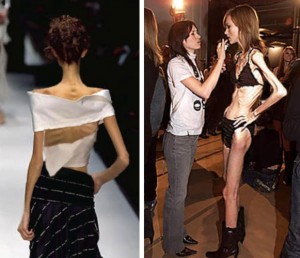EspañolFashion models in Buenos Aires may need to hit the scale before taking the catwalk. The city government has introduced a bill that would prevent models from working, if they have a body mass index (BMI) that is considered “underweight” by the World Health Organization.
According to the bill’s sponsor, underweight models perpetuate an “erroneous image of beauty.” The legislation aims to regulate the “exhibition of healthy [body] measurements” and to “protect models who are pressured into displaying increasingly smaller and unhealthy” body proportions. It also stipulates that agencies would be prohibited from firing models who comply with the law.

“The demands for increasingly thinner bodies affect the health of the models, sometimes even resulting in death,” the bill explains. Severe thinness, according to the legislation, “is harmful for boys and girls who watch those fashion parades and advertising campaigns in the media.”
It further notes that not protecting models and the general public from severe thinness, under the pretense of individual liberty, would be a “social disservice.” If passed, the law would require modeling agencies to file biannual reports on the health status of their models.
“For years, doctors and modeling agencies have questioned whether these models behave responsibly and understand the current [health] issue,” the bill concludes.
According to a 2011 survey by the Association to Fight Bulimia and Anorexia (ALUBA), 37 percent of women in Argentina suffer from an eating disorder.
The bill estimates penalties of up to AR$130,000 (US$8,390) for those companies which fail to comply with the regulation.
A source from the ruling PRO party in Buenos Aires tells the PanAm Post that he does not believe the bill will be debated this year, but adds that it is currently being assessed by the Congressional Health Commission.
The Weight of the State
Esteban Lijalad, an independent consultant and sociologist from the University of Buenos Aires, tells the PanAm Post that the bill is “another drop in the bucket” of what he has come to expect from the Argentinean state. He says the legislation suggests congressman must believe “people are stupid.”
“It implies that someone is the owner of the truth and that the government must educate us,” he says. “This is worse than public education, because they are attempting to educate us directly from the government.”
[adrotate group=”8″]
Lijalad believes the fashion-model bill must be examined within the context of a series of paternalistic policies that the government has introduced in recent years. He notes, for example, the prohibition on placing salt-shakers on restaurant tables, effective since 2011 in the province of Buenos Aires, and a “size law,” which forces clothing stores to provide a wide range of sizes for their products.
“How many anorexic people do we have in the country? Do you see many of them in the streets? Anorexia is a disorder. It’s not a consequence of fashion parades, and it won’t be solved just by prohibiting girls from being thin,” he argues.
The sociologist contends that the government cannot solve this problem, and advises anorexia patients to look for help elsewhere, like therapy or counseling. “Girls don’t become bulimic or anorexic because they read an article in a newspaper or attend to a fashion parade. [The state] wants to ban free thought.”
Whatever good intentions the bill may be advancing, Lijalad says it does not address the root of the problem. “[Anorexia] is a much deeper and complicated issue. It’s not a new thing,” he says.
 Versión Español
Versión Español












